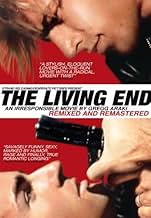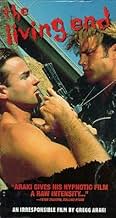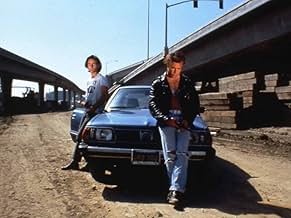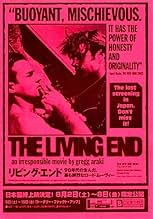PUNTUACIÓN EN IMDb
6,6/10
4,2 mil
TU PUNTUACIÓN
Añade un argumento en tu idiomaLuke is a gay hustler. Jon is a movie critic. Both are HIV positive. They go on a hedonistic, dangerous journey, their motto "Fuck the world".Luke is a gay hustler. Jon is a movie critic. Both are HIV positive. They go on a hedonistic, dangerous journey, their motto "Fuck the world".Luke is a gay hustler. Jon is a movie critic. Both are HIV positive. They go on a hedonistic, dangerous journey, their motto "Fuck the world".
- Premios
- 1 nominación en total
Brett Vail
- Ken
- (as Bretton Vail)
Chris Mabli
- Melrose NeoNazi
- (as Christopher Mabli)
Peter Grame
- Gus
- (as Peter Gramé)
Reseñas destacadas
Let's see: Bad lighting. Ugly cinematography. Barely audible sound. Profanity laced dialogue. Amateurish performances. Protagonists whose bad behavior is supposed to represent TRUTH. Cameos by Paul Bartel and Mary Woronov. Yep, we are in the world of indie filmmaking, where the mere fact that a semi-coherent film even gets completed on a budget of a buck-ninety-two is considered an artistic achievement. THE LIVING END is a cult film and considered something a landmark of gay cinema to boot. Two guys, who are HIV+ positive, act out violently to protest ... well, to protest just about anything and everything immediately available. The "angry young gay man" syndrome is in play: We're here, we're queer, we're going to be annoying. It was pretty radical stuff for the time; pre-Ellen, pre-Will-&-Grace, pre-Queer Eye. Now, in the era of legalized gay marriage, this seems rather quaintly naive: more Hope and Crosby than Butch and Sundance, let alone Thelma and Louise.
The problem is that, divorced from its historical context, THE LIVING END is just painfully mediocre at best and just plain bad much of the time. Even overlooking the fifth rate production values, you still have a contrived story, badly written, poorly directed and awkwardly acted. The tale involves Jon, who, on the day he learns he is HIV+, encounters Luke, a leather-jacketed stud on the run from freshly killing a trio of gay bashers. Jon is a nerd (he writes film reviews); Luke is a thug (he apparently has also killed a cop); and they head out on the road to who-knows-where. Luke claims he has fallen madly in love with Jon, while Jon seems gaga over Luke apparently because Luke looks hot in a leather jacket (and even hotter minus the jacket). Ultimately their road trip goes nowhere and little is done that couldn't have just as easily been done in Jon's cramped little apartment. Toss in a bothersome side story involving Jon's mother hen (read fag hag) best friend whose sex life goes south as she worries about Jon being AWOL, and the already threadbare narrative is revealed to be even flimsier.
But to give it credit, THE LIVING END was something different in its time. It deals with gay rage, AIDS and gives us anti-heroes who are hardly role models, but at least aren't negative stereotypes from the straight point of view. The film is subtitled "An Irresponsible Film by Gregg Araki," and several of the scenes are provocative. Certainly director Araki is not interested in political correctness, particularly in the way he attempts to link sex and violence as a common impulse. Indeed, the film's most powerful moment comes at the end as it ties rape and suicide into one graphic image. The final scenes are jolting, especially considering the banality of the rest of the film.
I want to be generous to this film because it is sincere and it is important within the subgenre of gay cinema. But it just isn't very good; there just isn't any nicer way to say it. THE LIVING END is a dead end.
The problem is that, divorced from its historical context, THE LIVING END is just painfully mediocre at best and just plain bad much of the time. Even overlooking the fifth rate production values, you still have a contrived story, badly written, poorly directed and awkwardly acted. The tale involves Jon, who, on the day he learns he is HIV+, encounters Luke, a leather-jacketed stud on the run from freshly killing a trio of gay bashers. Jon is a nerd (he writes film reviews); Luke is a thug (he apparently has also killed a cop); and they head out on the road to who-knows-where. Luke claims he has fallen madly in love with Jon, while Jon seems gaga over Luke apparently because Luke looks hot in a leather jacket (and even hotter minus the jacket). Ultimately their road trip goes nowhere and little is done that couldn't have just as easily been done in Jon's cramped little apartment. Toss in a bothersome side story involving Jon's mother hen (read fag hag) best friend whose sex life goes south as she worries about Jon being AWOL, and the already threadbare narrative is revealed to be even flimsier.
But to give it credit, THE LIVING END was something different in its time. It deals with gay rage, AIDS and gives us anti-heroes who are hardly role models, but at least aren't negative stereotypes from the straight point of view. The film is subtitled "An Irresponsible Film by Gregg Araki," and several of the scenes are provocative. Certainly director Araki is not interested in political correctness, particularly in the way he attempts to link sex and violence as a common impulse. Indeed, the film's most powerful moment comes at the end as it ties rape and suicide into one graphic image. The final scenes are jolting, especially considering the banality of the rest of the film.
I want to be generous to this film because it is sincere and it is important within the subgenre of gay cinema. But it just isn't very good; there just isn't any nicer way to say it. THE LIVING END is a dead end.
A film I enjoyed far more than I 'should' have, given how many individual moments I disliked.
Full of somewhat forced, wanna-be John Waters style humor that is sometimes funny, but often just over-arch and clunky. And some of the acting is weak, the rest only pretty good.
Yet underneath it all there is something moving, honest and raw in its punky rage at the world from an HIV positive point of view.
Sort of a gay, surrealist Thelma and Louise made on a shoestring. For all the moments I rolled my eyes, I feel like it will stick with me over time.
Full of somewhat forced, wanna-be John Waters style humor that is sometimes funny, but often just over-arch and clunky. And some of the acting is weak, the rest only pretty good.
Yet underneath it all there is something moving, honest and raw in its punky rage at the world from an HIV positive point of view.
Sort of a gay, surrealist Thelma and Louise made on a shoestring. For all the moments I rolled my eyes, I feel like it will stick with me over time.
The cutting edge of early '90's American film includes this work by Gregg Araki, a frightfully funny, harrowing tale of two HIV positive dudes who can't stand it all, blame (then president) George Bush, and take it all on the road for a final (?) spree. The film contains the typical cute gay boys, friendly fag-hag with her own hetero issues, violence, and ridiculously corny Araki dialogue. And guess what? It somehow all works! By the end the two protagonists are likeable people with relatable feelings. The closing scene is one of the most memorable in indie cinema of the '90's.
Gregg Araki is certainly one of the strangest directors ever to emerge in the genre of independent filmmaking, and "The Living End" is no exception to his unique style, which is reminiscent of Jean-Luc Goddard while maintaining an individuality that makes it clearly a film by Araki. I've heard the film described as a "gay 'Thelma & Louise,'" but I think this to be inaccurate. This film I think is far more powerful than "Thelma & Louise." Two HIV positive gay men, one the sensible-living perfectly normal Jon, the other the free-wheeling hustler Luke, who from the very first shot in the film we can tell has totally given up as he graffitis "F**k the World" on the wall. More typical Araki catches phrases run rampant throughout the film as these two men go on a road trip around the west coast trying to find something worth their time. What makes the film so powerful is the presentation of its message, rather than the message itself. The difference between sex and real love is subtlely explored as the relationship between Jon and Luke grows more and more complicated, as Luke's hairtrigger attitude often gets them in trouble and Jon steadily wanting to give up love to continue his life for as long as he can and as responsibly as he can, though it never seems to work. Sometimes it's not so subtle, but for the most part the notion of love between these two people is so skillfully handled that the air of sadness that hangs over them just resonates, in spite of the large number of humorous moments. The ending is so brutally sad, though totally unexpected. I won't give it away but you'll have to see it for yourself, it is a wonderful movie. It certainly is not for all tastes. However, if you can appreciate good cinema, then I think this film will not disappoint you. You might not like it, but it is a very powerful film.
My first impression going in to see "Brokeback Mountain" when that one came out, was; "How boringly common gay love seem to be". And i thought of it being boringly common in a cinematic sense. Only rule broken in that movie was to make it possible for a large audience to have empathy with it characters without hiding the gayness of them. It worked. I salute that. And i still think that was the performance that earned Ledger his Oscar.
But Arakki does not stay within content when making his movies great (when they are). His style is widely overlooked by his "controversial" content. Even though the two are matched as should be in good art craft.
Let me just give you one example to look for. One scene, in the beginning of the movie, we see the character of Luke, who's been hustling another man, back at that mans place. Suddenly the john's wife or girlfriend appears and the acting style changes to that of badly made porn. But not only the style of acting, also the cutting. The woman and Luke never appear in the same frame and the shots of him reacting to her, could have been taken weeks apart (a common use in porn to make models appear in the same scene, although they were never on set). The woman is acting so badly, that it can only be a parody of the clichés of porn too, since, Arraki surely knows how to get good actors and know how to direct them.
Lots of other good stuff could be commented on, but let me just get back to my pronouncing it the best gay LOVE story told on screen; Even thought the character of Luke can be seen as only a projection of Jon's diagnosis as HIV positive (His way of coping with it as Scottie has to invent Madelaine in "Vertigo" facing death).... it still is a love story, sick as it may seem. And a hell of a lot closer to fulfilling what we look for in love stories, than the ones with either happy or weepy ends. This one has both and rings truer.
But Arakki does not stay within content when making his movies great (when they are). His style is widely overlooked by his "controversial" content. Even though the two are matched as should be in good art craft.
Let me just give you one example to look for. One scene, in the beginning of the movie, we see the character of Luke, who's been hustling another man, back at that mans place. Suddenly the john's wife or girlfriend appears and the acting style changes to that of badly made porn. But not only the style of acting, also the cutting. The woman and Luke never appear in the same frame and the shots of him reacting to her, could have been taken weeks apart (a common use in porn to make models appear in the same scene, although they were never on set). The woman is acting so badly, that it can only be a parody of the clichés of porn too, since, Arraki surely knows how to get good actors and know how to direct them.
Lots of other good stuff could be commented on, but let me just get back to my pronouncing it the best gay LOVE story told on screen; Even thought the character of Luke can be seen as only a projection of Jon's diagnosis as HIV positive (His way of coping with it as Scottie has to invent Madelaine in "Vertigo" facing death).... it still is a love story, sick as it may seem. And a hell of a lot closer to fulfilling what we look for in love stories, than the ones with either happy or weepy ends. This one has both and rings truer.
¿Sabías que...?
- CuriosidadesThe end credits finish with the following words: "dedicated to craig lee (1954-1991) and the hundreds of thousands who've died and the hundreds of thousands more who will die because of a big white house full of republican fuckheads".
- ConexionesFeatured in El celuloide oculto (1995)
- Banda sonoraWhere The Pavement Ends
Performed by Braindead Sound Machine
Selecciones populares
Inicia sesión para calificar y añadir a tu lista para recibir recomendaciones personalizadas
- How long is The Living End?Con tecnología de Alexa
Detalles
Taquilla
- Presupuesto
- 22.769 US$ (estimación)
- Recaudación en Estados Unidos y Canadá
- 692.585 US$
- Fin de semana de estreno en EE. UU. y Canadá
- 43.715 US$
- 16 ago 1992
- Recaudación en todo el mundo
- 692.585 US$
Contribuir a esta página
Sugerir un cambio o añadir el contenido que falta

Principal laguna de datos
By what name was Vivir hasta el fin (1992) officially released in India in English?
Responde
























